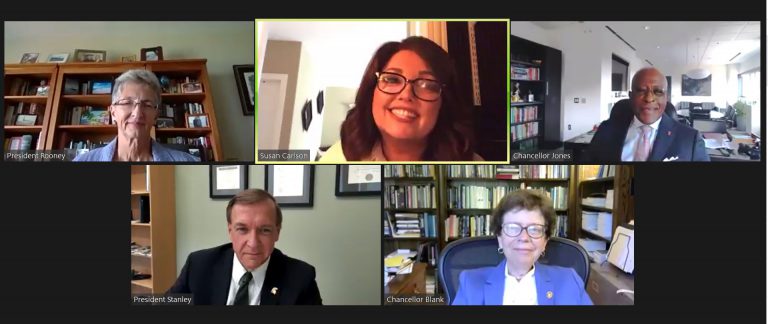URBANA – University leaders from across the Midwest say they’re concerned about a drop in international student enrollment this fall, given new restrictions imposed on foreign students by U.S. Immigration and Customs Enforcement.
University of Illinois at Urbana-Champaign Chancellor Robert Jones, Michigan State University President Samuel Stanley, University of Wisconsin-Madison Chancellor Rebecca Blank and Loyola University Chicago President Jo Ann Rooney addressed the issue during a webinar hosted by the Lincoln Forum in partnership with the Union League Club of Chicago and POLITICO on Wednesday.
U.S. Immigration and Customs Enforcement issued a rule Monday barring international students from living in the country while taking a full online course load. According to ICE, the U.S. Department of State won’t issue visas to international students enrolled in schools or programs that are fully online, and international students currently in the country that are enrolled in such programs must leave or transfer to another college or university offering in-person instruction in order to legally remain in the U.S. If not, the rules say they could face deportation. For students attending schools taking a hybrid approach — meaning a mix of online and face-to-face instruction — international students on an F-1 visa will be able to take more than one online class, but only so long as their university or college certifies that the program is not entirely online and that the student isn’t taking only online classes.
Shortly after ICE announced the rule, Harvard University and the Massachusetts Institute of Technology filed a lawsuit against the Trump administration over the directive.
U of I Chancellor Jones said during the webinar that international students should still be able to come to campus and attend classes at the university, given its plan to offer a mix of online and in-person instruction. Both the University of Wisconsin-Madison and Michigan State have announced similar plans to offer a mix of face-to-face classes and virtual learning. University of Loyola Chicago President Jo Ann Rooney says they’re still figuring out what the fall will look like, but she says their preferred plan is to also offer a hybrid model.
But Jones acknowledged that international students may be dissuaded from coming to American universities given the possibility that COVID-19 infections could spike and face-to-face classes may be moved online.
“I think we are all very much concerned about this…this may have a very negative impact on the number of students that actually come to our universities even more so than what we were concerned about before,” Jones said.
Stanley, president of Michigan State, said his campus had seen a 26% reduction in deposits from international students as compared to last year.
But he said enrollment figures for domestic students are up over last year.
Jones said he expects domestic undergraduate enrollment to be on par with figures from last fall and perhaps even slightly higher. Rooney, at Loyola, said they’ve witnessed a similar trend on their campus.
“With the fall, we’re seeing good indications with students returning, even our entering freshman class. There really is this interest to continue and engage with their education,” Rooney said.
Finances, athletics and student life
Stanley and Jones both cited concerns regarding their respective universities’ finances. Stanley said a decrease in international student enrollment will hurt his institution’s bottom line.
Roberts said the pandemic has thus far cost the U of I’s Urbana campus upwards of $80 million dollars. He said that figure could rise precipitously depending on what happens this fall, and whether athletics can resume.
“One of the biggest issues for us is whether or not there will be football in the fall and basketball subsequent to that,” Jones said. Stanley added that the notion that online instruction costs less is false. He says the majority of the university’s costs are for teaching salaries, which remain a constant expense regardless of how the education is delivered. Jones said the U of I has also had to purchase computers for students who need them.
Blank with the University of Wisconsin-Madison says her campus is unveiling a marketing campaign focused on COVID-19 safety. Jones says the U of I is taking a similar approach. He warned that students and campus organizations, including fraternities and sororities, that flout social distancing and mask requirements will face consequences for their behavior.
“And not only in terms of what happens during the course of the day when they are going to classes and between classes… they must adhere to those core principles and there will be consequences if they do not adhere according to what we developed in our student conduct code,” Jones said.
But Rooney, at Loyola, said enforcing compliance through discipline is not feasible.
“The only way we are going to be successful at creating the healthy culture that we want to create on campus is going to be through proactive and positive peer pressure and positive messaging,” she said. “Those proactive and positive messages about who we are as a community is going to have to drive this, because we can’t enforce this student by student.”
Jones said he agreed.
“But we do think, if necessary, we have to have some way of enforcing behavior if there is a continued disregard for the health and safety of others,” he said.
Follow Lee Gaines on Twitter: @LeeVGaines

